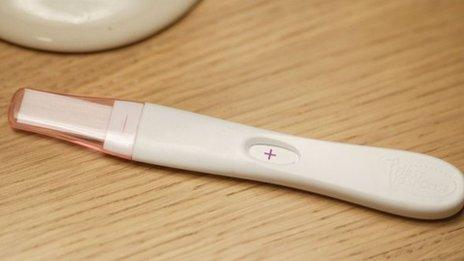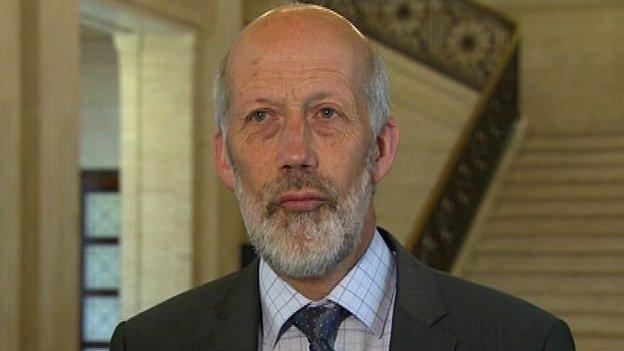NI abortion law: Health Minister Simon Hamilton issues draft guidelines
- Published

A judge at the High Court in Belfast ruled that there should be exemptions to the abortion law
Health Minister Simon Hamilton has circulated new draft guidelines on current abortion law and practice to his Executive colleagues.
It follows a ruling that abortion legislation in Northern Ireland is in breach of human rights law.
Currently, termination of pregnancy is only allowed if a woman's life is at risk or there is a permanent or serious risk to her mental or physical health.
The Northern Ireland Human Rights Commission (NIHRC) brought the case.
It wants to extend abortion to cases of serious foetal malformation, rape or incest.
The 1967 Abortion Act does not apply to Northern Ireland.
'Clarify'
Mr Hamilton said the guidelines had been drawn up after consultation with health professionals and would be made public after they had been considered by his Executive colleagues.
"I think the guidelines offer an opportunity to clarify satisfactorily the law as it currently stands in Northern Ireland," he said.
On Monday, a judicial review, external found the grounds for abortion should be extended in Northern Ireland.

Sarah Ewart travelled to England for an abortion
The court's finding has been welcomed by a Northern Ireland woman whose story of her personal experience brought the issue to prominence in 2013.
At 20 weeks pregnant, Sarah Ewart travelled to England for an abortion after her baby had been diagnosed with anencephaly, a condition in which the brain has not developed.
She told the Nolan Show on Tuesday that she was "so pleased and relieved that we can get medical attention in our hospitals in our own country".
"At the start we'll just take small steps and see where we go from here," she said.
Northern Ireland's Attorney General John Larkin said in a brief statement that he was "profoundly disappointed" by the decision and was "considering the grounds for appeal".
In his ruling on Monday, Mr Justice Horner said women who were the victims of sexual crime and cases of fatal foetal abnormality were entitled to exemptions in the law.
He said given that the issue was unlikely to be addressed by the Northern Ireland Executive in the foreseeable future, and that Northern Ireland citizens were entitled to "have their [European Convention on Human] rights protected by the courts", the current legislation was in breach of their human rights.
The Lord Chief Justice's Office has indicated that the court cannot force legislation to be changed and that the final decision stops with Parliament.
- Published30 November 2015

- Published3 June 2015

- Published16 April 2015

- Published9 October 2013
